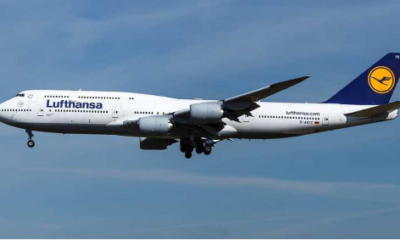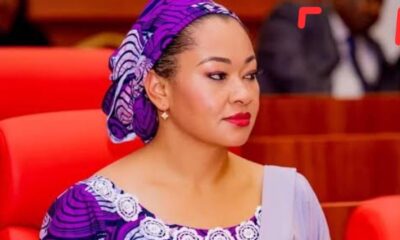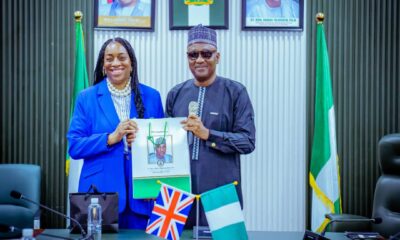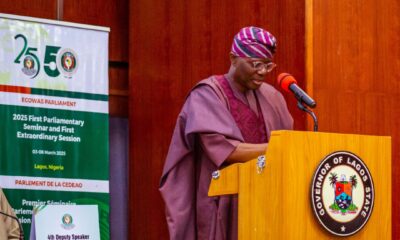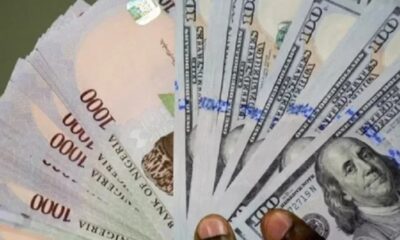Economy
Panic as queues surface in Abuja
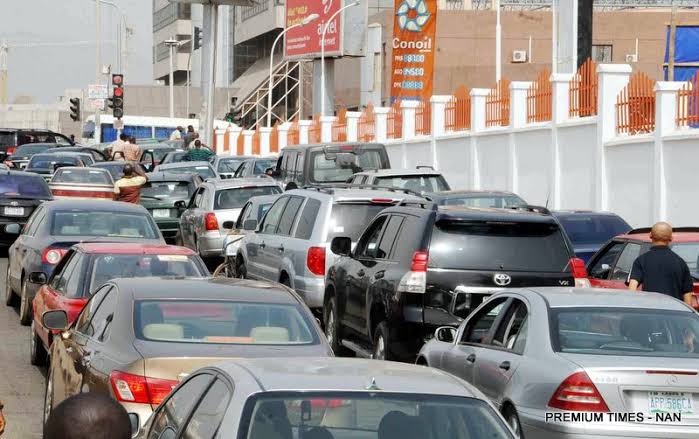
* Depots reportedly hike price to N710/litre
By Francesca Hangeior.
Fresh queues for Premium Motor Spirit, popularly called petrol, surfaced in Abuja, parts of Niger and Nasarawa States on Friday, following the closure of many filling stations operated by independent marketers.
According to reports, dealers closed their retail outlets due to their inability to access petrol as a result of the hike in the ex-depot price of the commodity to N710/litre by private depot owners.
Motorists besieged the few stations that dispensed petrol on Friday, particularly those operated by the Nigerian National Petroleum Company Limited and some major oil marketers in Abuja and neighbouring states.
This led to massive queues in outlets, such as the NNPC mega station on the Gwarimpa axis of the Zuba-Kubwa Expressway, Conoil and Total filling stations directly opposite the headquarters of NNPC in the Abuja city centre, and Salbas filling station at the Dei-Dei end of the Zuba-Kubwa expressway, among others.
Independent oil marketers, who own over 70 per cent of filling stations across the country, blamed the hike in the ex-depot price of petrol as dispensed by private depot owners.
The National President of the Independent Petroleum Marketers Association of Nigeria, Abubakar Maigandi, said that private depot owners had raised the ex-depot price of PMS to N710/litre, whereas the pump price of the commodity at NNPC retail stations was N617/litre.
Maigandi said, “The current situation is a result of how the private depot owners have been selling their products. It has been very difficult for independent petroleum marketers to get the product and sell it in Abuja and neighbouring states, as well as in other states in the North.
“So, the queues you are seeing now are because of the cost of PMS by private depots. The private depots are selling at N710/litre, but if you check the price of the same product at NNPC retail outlets, it is N617/litre.
“Therefore, by the time the independent marketers buy from private depots and bring it to our filling stations, we will not be able to sell our product because our cost price is already so high, while the cost at NNPC retail outlets is far lower.
“And you know that when we buy it at the rate of N710/litre, we have to add transportation cost again because there is no equalisation. And when we add the cost of transportation, the pump price is going to be higher than the N710/litre ex-depot price, whereas NNPC stations sell at N617/litre.”
Maigandi explained that because of the widespread number of stations operated by IPMAN, any distortion in the supply of products to members of the group would lead to fuel queues because major marketers and NNPC stations were fewer in number.
On whether IPMAN members cannot get direct PMS supply from NNPC, instead of buying the product from private depots, he replied, “That is what we have been negotiating with them (NNPC), and they promised us that they will start giving us our allocation.
“They have started, but the quantity is small compared to the number of retail outlets operated by IPMAN nationwide. We are getting products from NNPC, but the volume is too small for our members.
“So, we are requesting additional volumes because, in Abuja alone, we have over 250 retail outlets belonging to IPMAN members. This is just for Abuja. We have not talked about Niger, Kaduna, and other states in the North, not to mention the number nationwide.”
Maigandi, however, stated that the queues for petrol were not pronounced in remote villages, adding that “when you go to the villages, you will see that there are no queues.”.
“But in the city centres, where you have NNPC stations selling very cheaper than the N710/litre price, you will see queues there, as well as in front of the few outlets that have products to dispense.”
The IPMAN president said petrol was not scarce, as there were enough volumes in-country concerning what was imported by NNPC – Nigeria’s sole importer of the commodity.
Economy
75.5% of rural Nigerians now live below poverty line — World Bank

The World Bank has disclosed that a staggering 75.5 per cent of rural Nigerians are now living below the poverty line, reflecting deepening hardship in the country’s hinterlands.
This was revealed in the Bank’s April 2025 Poverty and Equity Brief for Nigeria, which paints a grim picture of worsening economic hardship, widening inequality, and persistent underdevelopment across much of the nation.
While poverty is widespread among urban populations, the report emphasised that the situation is significantly worse in rural areas, where economic stagnation, high inflation, and insecurity have exacerbated living conditions.
“Based on the most recent official household survey data from Nigeria’s National Bureau of Statistics, 30.9 per cent of Nigerians lived below the international extreme poverty line of $2.15 per person per day in 2018/19 before the COVID-19 pandemic,” the report stated.
The report also highlighted Nigeria’s enduring regional disparities. “Nigeria remains spatially unequal. The poverty rate in northern geopolitical zones was 46.5 per cent in 2018/19, compared with 13.5 per cent for southern ones. Inequality measured by the Gini index was estimated at 35.1 in 2018/19.
“Nigeria’s Prosperity Gap — the average factor by which individuals’ incomes must be multiplied to attain a prosperity standard of $25 per day for all — is estimated at 10.2, higher than most peers.”
Despite successive policy interventions, these figures underscore a persistent economic divide across the country.
The report’s demographic analysis found that children aged 0 to 14 years had a poverty rate of 72.5 per cent, reflecting the scale of deprivation among the youngest segment of the population.
Gender disparities were also observed, with 63.9 per cent of females and 63.1 per cent of males classified as poor under the $3.65 per day lower-middle-income threshold.
Education emerged as a significant determinant of poverty, with Nigerians lacking formal education experiencing a poverty rate of 79.5 per cent. This contrasts with 61.9 per cent for those with primary education and 50.0 per cent for secondary school graduates. Only 25.4 per cent of those with tertiary education were considered poor.
The report also drew attention to multidimensional poverty indicators, which further reflect widespread deprivation.
According to the World Bank, about 30.9 per cent of Nigerians live on less than $2.15 daily, 32.6 per cent lack access to limited-standard drinking water, 45.1 per cent do not have limited-standard sanitation, and 39.4 per cent have no electricity.
Education access remains a challenge, with 17.6 per cent of adults yet to complete primary education, and 9.0 per cent of households reporting at least one school-aged child not enrolled in school.
The report noted that even before the COVID-19 pandemic, efforts to reduce extreme poverty had largely stalled.
“Before COVID-19, extreme poverty reduction had almost stagnated, dropping by only half a percentage point annually since 2010. Living standards of the urban poor are hardly improving, and jobs that would allow households to escape poverty are lacking,” the report read.
Although the World Bank acknowledged recent economic reforms aimed at stabilising Nigeria’s macroeconomic outlook, it warned that persistently high inflation continues to undermine household purchasing power, particularly in urban areas where incomes have not kept pace with rising costs.
In light of the worsening situation, the Bank called for urgent policy action to shield vulnerable groups from inflationary shocks and to drive job creation through more productive economic activities.
Economy
Naira Records Marginal Decline Against Dollar at Official Market

The Nigerian naira experienced a mild drop in value on Friday, closing at ₦1,602.18 per dollar in the official foreign exchange market, based on figures released by the Central Bank of Nigeria (CBN).
This marks a decrease of ₦5.49 from the rate of ₦1,596.69 recorded on April 30, the last trading day before the May 1 Workers’ Day holiday—indicating a depreciation of approximately 0.34%.
Earlier in the week, from Monday to Wednesday, the naira remained relatively stable, exchanging at ₦1,599.95, ₦1,599.71, and ₦1,596.69 respectively.
Although the local currency showed some consistency mid-week, it wrapped up the week with a loss, following a sligh dip of 0.02% at the beginning of the week
Economy
Black Market Dollar hits N1,610 Amid Economic quagmire

What is the Dollar to Naira Exchange Rate in the Black Market (Also Known as the Parallel Market or Aboki FX)?
Below is the black market exchange rate for the U.S. dollar to the Nigerian naira as of Thursday, May 1, 2025. These are the typical rates at which you can exchange dollars for naira:
Dollar to Naira Black Market Exchange Rate (May 1, 2025):
At the Lagos Parallel Market, also referred to as the black market, Bureau De Change (BDC) operators are buying dollars at ₦1,602 and selling at ₦1,610, according to market sources.
Please note: The Central Bank of Nigeria (CBN) does not recognize or endorse transactions conducted on the parallel market. The CBN advises individuals and businesses seeking foreign exchange to use official banking channels.
-

 News19 hours ago
News19 hours agoVDM: Release my guy now, singer Davido tells EFCC
-

 Economy9 hours ago
Economy9 hours ago75.5% of rural Nigerians now live below poverty line — World Bank
-

 News19 hours ago
News19 hours agoFormer Plateau deputy governor is dead
-

 News10 hours ago
News10 hours agoMassive turnout as Bishop David Abioye holds first service in new church + Video
-

 News19 hours ago
News19 hours ago“I’m not thinking of a third term agenda -Trump
-

 News10 hours ago
News10 hours agoHow US-Based Yoruba Monarch Died After Brutal Assault In Oyo Palace, Allegedly Ordered By Alaafin Amid Supremacy Row With Ooni Of Ife
-
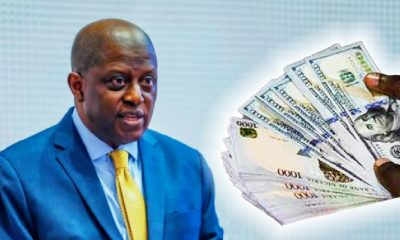
 Opinion24 hours ago
Opinion24 hours agoCBN 2024 financial performance an indicator Cardoso’s twerking yielding results
-

 News2 hours ago
News2 hours agoTinubu to meet Gencos over N4tn electricity debt




